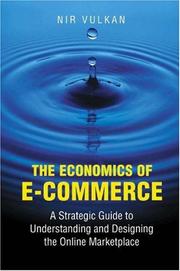| Listing 1 - 7 of 7 |
Sort by
|

ISBN: 9780691089065 069108906X 0691214549 Year: 2003 Publisher: Princeton: Princeton university press,
Abstract | Keywords | Export | Availability | Bookmark
 Loading...
Loading...Choose an application
- Reference Manager
- EndNote
- RefWorks (Direct export to RefWorks)
Book
ISBN: 9780691214542 Year: 2020 Publisher: Princeton, NJ
Abstract | Keywords | Export | Availability | Bookmark
 Loading...
Loading...Choose an application
- Reference Manager
- EndNote
- RefWorks (Direct export to RefWorks)
Multi
ISBN: 9780691214542 Year: 2020 Publisher: Princeton, N.J. Princeton University Press
Abstract | Keywords | Export | Availability | Bookmark
 Loading...
Loading...Choose an application
- Reference Manager
- EndNote
- RefWorks (Direct export to RefWorks)
Book
ISBN: 0198743777 0191668435 0199570515 9780191668432 9780191765957 0191765953 1299939759 9781299939752 9780199570515 Year: 2014 Publisher: Oxford : Oxford University Press,
Abstract | Keywords | Export | Availability | Bookmark
 Loading...
Loading...Choose an application
- Reference Manager
- EndNote
- RefWorks (Direct export to RefWorks)
This handbook brings together the latest research on applied market design. It surveys matching markets: environments where there is a need to match large two-sided populations to one another, such as law clerks and judges or patients and kidney donors.
Game theory. --- Markets --- Statistical matching. --- Supply and demand. --- Mathematical models. --- Demand and supply --- Industrial production --- Law of supply and demand --- Economics --- Competition --- Exchange --- Overproduction --- Prices --- Value --- Concatenation, File (Statistics) --- Data fusion (Statistics) --- Data matching (Statistics) --- Data merging (Statistics) --- File concatenation (Statistics) --- Fusion, Data (Statistics) --- Imputation, Mass (Statistics) --- Mass imputation (Statistics) --- Matching, Data (Statistics) --- Matching, Statistical --- Merging, Data (Statistics) --- Microsimulation modeling (Statistics) --- Modeling, Microsimulation (Statistics) --- Sampling (Statistics) --- Public markets --- Commerce --- Fairs --- Market towns --- Games, Theory of --- Theory of games --- Mathematical models --- Mathematics --- Supply and demand --- Statistical matching --- Game theory --- E-books
Book
ISBN: 9780199570515 Year: 2013 Publisher: Oxford Oxford university press
Abstract | Keywords | Export | Availability | Bookmark
 Loading...
Loading...Choose an application
- Reference Manager
- EndNote
- RefWorks (Direct export to RefWorks)
Book
Year: 2005 Publisher: London Centre For Economic Policy Research, International Macroeconomics. Discussion Paper Nr.5032. May 2005
Abstract | Keywords | Export | Availability | Bookmark
 Loading...
Loading...Choose an application
- Reference Manager
- EndNote
- RefWorks (Direct export to RefWorks)
Book
Year: 2019 Publisher: Cambridge, Mass. National Bureau of Economic Research
Abstract | Keywords | Export | Availability | Bookmark
 Loading...
Loading...Choose an application
- Reference Manager
- EndNote
- RefWorks (Direct export to RefWorks)
We use equity crowdfunding data to ask how fundraising amounts can be explained by what entrepreneurs ask for, versus what investors want to invest. The analysis exploits unique features of crowdfunding where entrepreneurs not only set investment goals, but also chose when to close their campaigns. More experienced and more educated founder teams ask for more. Their campaigns succeed more often, and they raise more money. Female teams ask for less, are equally successful, yet raise significantly less. They also wait longer before closing campaigns, suggesting they want to raise more than what they originally asked for.
| Listing 1 - 7 of 7 |
Sort by
|

 Search
Search Feedback
Feedback About UniCat
About UniCat  Help
Help News
News